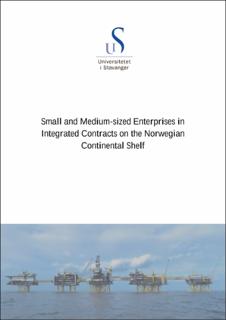| dc.description.abstract | Projects in the Norwegian oil and gas industry are immense and generate a large number of working hours and income for the supplier industry as well as the society. In recent years, integrated contracts have become more common between operator and oil service companies for well construction projects offshore. In this thesis, the purpose is to look more closely at whether integrated contracts can help small and medium-sized companies excel in the Norwegian oil and gas industry. The aspiration behind this is to investigate whether the contract form itself can be a contributor to include several companies in the same project and together deliver a total product. Therefore, companies' ability to collaborate, communicate, share data and information is examined.
In order to answer our research questions and main research issue, a qualitative method is used to collect pertinent data. We conducted eight in-depth interviews in six different companies in order to get representatives from all stages in an integrated contract. The results we obtained are further discussed against relevant theory and research questions. The findings show that integrated contracts are particularly convenient for operators and the large oil service companies that have the capacity to deliver a total delivery. On the other hand, this will make it more difficult to include small and medium-sized enterprises that specialize in a specific segment. If, contrarily, the small and medium-sized enterprises have a well-established network and an exceptional product that suppliers have not been able to emulate, there may be better chances of being included. When it comes to the use of digital platforms, it turns out that these are positively received and used in large parts of the industry, so it becomes easier for them to share data, keep in touch, and follow each other up. Nevertheless, there are some companies that do not participate in this development and miss out on supplied opportunities. Furthermore, trust is an important factor in achieving success with digital platforms. Companies should thus have a more comprehensive focus on trust as well as focus on security mechanisms. There is a clear tendency for data sharing that largely affects digital platforms in Norway's oil and gas industry. Therefore, data sharing between different digital platforms could be necessary for the future, as these will probably relate to each other. Moreover, our results indicate that this is a complex topic, which therefore should be given greater attention.
There is minimal research that touches on this particular limitation and can therefore be highly interesting to take a closer look at. | |
